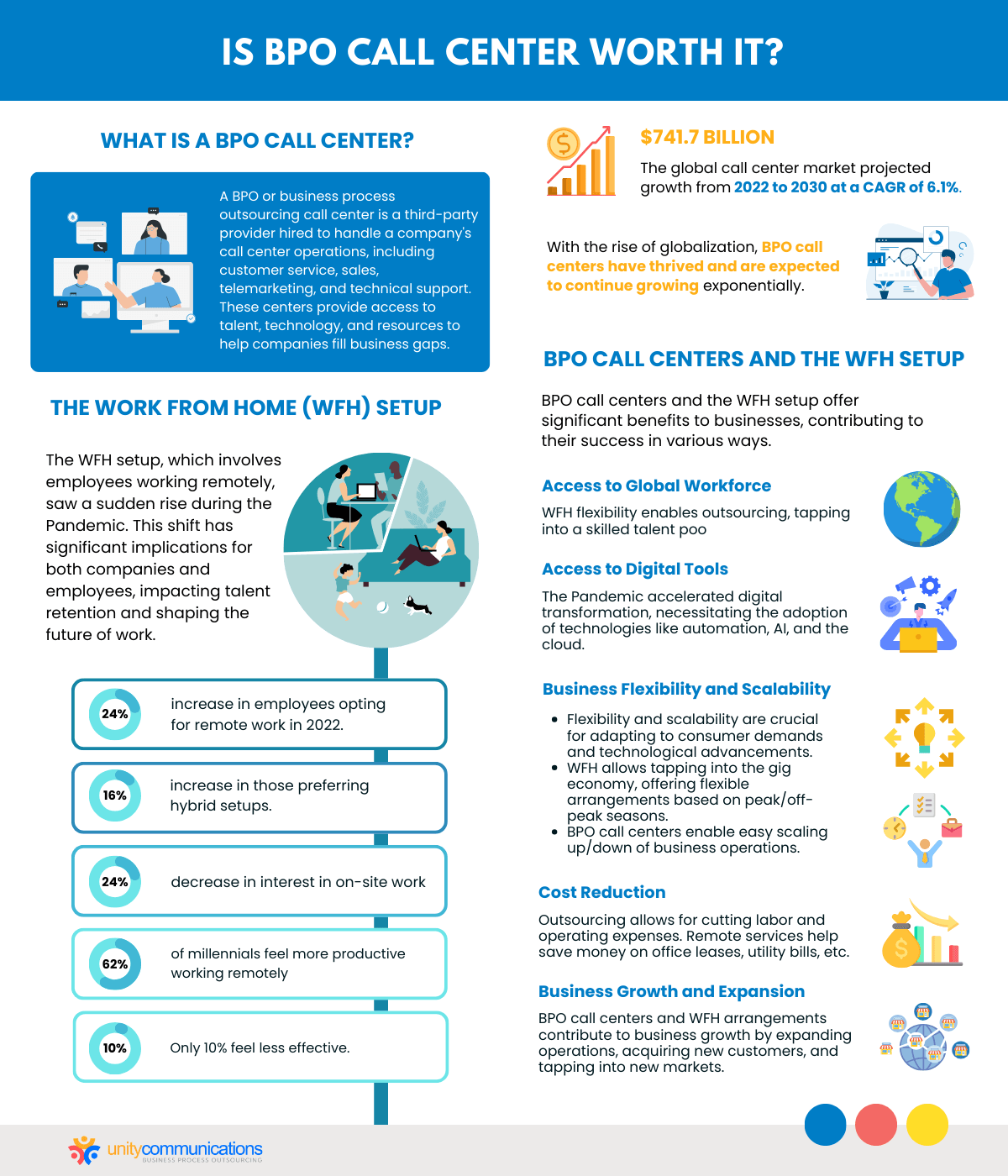Table of Contents
Since the pandemic, business process outsourcing (BPO) and work-from-home (WFH) have become buzzwords. They are popular strategies for reducing costs, optimizing operations, and achieving growth. However, these business trends have also posed inevitable challenges to companies and organizations.
Now that we are decidedly in a “post-pandemic” environment, here are the questions we seek to answer:
- Is a BPO call center worth it?
- Is WFH the best setup for your business?
- Are these trends a boon or a bane?
Read on to see if BPO call centers and WFH arrangements are worth keeping in 2024.
Exploring BPO Call Centers and the WFH Setup as Business Trends

The business landscape is ever-changing and ever-evolving. Now and then, new trends will emerge and take the whole world by storm. However, the longevity and durability of any trend are primary concerns for businesses considering joining the bandwagon.
While artificial intelligence (AI) may have the world’s attention now, outsourcing and remote work were the most prevalent strategies during and immediately after the pandemic. The global event accelerated the widespread adoption of these approaches among businesses, and many now wonder if they were a boon or a bane.
The next section explores these two popular business trends: BPO call centers and the WFH setup.
The Exponential Growth of BPO Call Centers
To begin, what is a BPO call center? This term refers to a third-party provider hired to manage a company’s call center operations. The BPO partner supplies a team of agents to handle customer service, sales or telemarketing, and technical support.
The BPO call center’s worth lies in allowing clients to access talent, technology, and resources to fill business gaps. Companies outsource to reduce operating costs, prioritize core operations, streamline processes, enhance customer satisfaction, and achieve business growth.
Since the advent of globalization, BPO call centers have thrived, and they are expected to keep growing and expanding exponentially. The global call center market could grow from $461.1 billion in 2022 to $741.7 billion by 2030 at a compound annual growth rate (CAGR) of 6.1%.
The Sudden Rise of the WFH Setup
For the uninitiated, the WFH setup is what it sounds like. Companies have long adopted this work arrangement, especially when hiring remote contractors and freelancers. However, the pandemic paved the way for the rise of the WFH set up worldwide.
After asking whether the BPO call center is worth it, companies might wonder if WFH or hybrid arrangements will endure in the corporate setting. From employees’ perspectives and considering talent retention, remote work has significantly shaped the current and future business landscape.
According to Owl Labs, the number of employees opting for remote work rose by 24% in 2022. Individuals preferring hybrid setups increased by 16%, while professionals showing interest in on-site work decreased by 24%. Surprisingly, 62% of millennial workers feel more productive working remotely, and only 10% feel less effective.
Additionally, 66% of employees will start looking for flexible jobs if WFH arrangements are no longer available, while 39% will immediately resign.
How BPO Call Centers and the WFH Setup Help Businesses Succeed

With the advent of globalization, almost every business knows what BPO is. Since about 2020, every employee has also become familiar with remote work. Both business trends have since endured for good reasons.
But is a BPO call center worth it in 2024? Is WFH still a good value proposition for your business?
Let us examine how BPO call centers and the WFH setup can benefit your business.
They Let Companies Tap into the Global Workforce
The labor shortage has become a prevalent issue globally, further exacerbated by the Great Resignation. In the U.S. alone, 47 million individuals resigned from work in 2021, and the problem persists. While the country has over 10 million available jobs, only 6 million applicants can fill them.
Outsourcing and remote work can address labor scarcity worldwide. But what is the BPO call center’s worthy contribution to this issue? How does WFH help reduce the workforce shortage? WFH’s flexibility enables outsourcing and gives you access to a vast pool of skilled talent. Offshore and nearshore outsourcing lets you hire affordable foreign agents for your call center operations.
They Give Businesses Access to Digital Tools and Competencies
Technology plays a crucial role in today’s business landscape. According to McKinsey, the pandemic has accelerated digital transformation in companies worldwide. Organizations must adopt digital tools and technologies such as automation, AI, and the cloud to gain a competitive advantage.
But when it comes to accessing technology, do you need a BPO call center? Is investing in cloud solutions and technology to allow the WFH setup worth it? BPO providers use the latest technological resources to serve their clients better. Remote professionals also have the digital skills and technological resources to meet business needs.
They Offer Business Flexibility and Scalability
The business landscape has drastically changed due to consumer demands and technological advancements. Companies must adapt to progress and developments and stay up-to-date with business trends. Flexibility and scalability are crucial to achieving these objectives.
Does WFH offer flexibility and scalability? Is a BPO call center worth the cost? You can tap into the gig economy by allowing remote work arrangements for your business. You can provide flexible offers to freelancers and contractors based on your call center’s peak and off-peak seasons. The same logic applies to hiring a BPO call center, which allows you to easily scale your business up and down.
They Help Reduce Labor and Operating Expenses
Generating income and reducing expenses are vital to maintaining business cash flow. While many companies work hard to make more money, some are wise enough to save money on expenditures by utilizing BPO and WFH.
According to Deloitte, cost reduction is the top outsourcing reason. But if you wonder whether a BPO call center is worth it, the answer is yes. Generally, outsourcing allows you to cut labor and operating expenses. Since most outsourced services are remote, they also let you save money on office leases, utility bills, and other on-site costs.
They Allow for Business Growth and Expansion
Every business aspires to grow and expand. Clutch cites that nine out of ten small companies plan to outsource in 2022. Nearly 20% of them outsource to grow their businesses. But is a BPO call center still worth it in 2024? What about WFH arrangements?
Hiring remote staff through freelancing platforms or reliable service providers can expand your operations and grow your business. If you plan to operate globally and tap into new markets, employing an overseas workforce can help. Their skills and expertise can help you acquire and win new customers for your business.
Possible Drawbacks of BPO Call Centers and the WFH Setup
Based on the potential benefits above, it is safe to say that BPO call centers and the WFH setup are worth it. However, these trends still have some potential disadvantages. Businesses implementing these strategies should be wary of the following:
- Losing business control. Outsourcing means delegating call center functions to a third party. The WFH setup entails entrusting work to staff outside your office. You might lose control over your business if you do not take ownership or monitor your operations. Ensure you have regular communication and collaboration with third-party and remote teams.
- Facing cultural differences. Offshore outsourcing involves working remotely with a BPO provider in another country. You might encounter cultural differences that hinder communication and collaboration in this situation. So provide your team with cultural orientations and training programs.
- Employing unmanageable staff. Not working directly with your call center agent, whether through BPO or remote freelancing, has consequences. Managing your call center staff might be difficult, affecting productivity and service delivery. To address this, create a service-level agreement (SLA) and set key performance indicators (KPIs) for your staff to meet.
- Compromising privacy and security. Outsourcing lets you entrust business data to a third party. However, your hired BPO partner might expose your information to physical and cyber attackers. Meanwhile, WFH staff can also put your business at risk if they do not secure their systems and networks. Make privacy and security your priorities to avoid costly mitigation efforts.
- Encountering business disruptions. BPO call centers and WFH staff likely work in different parts of the globe. Your staff might experience disruptions brought on by natural calamities, public holidays, and geopolitical events, causing serious business repercussions. To mitigate this risk, create a thorough contingency plan.
Are BPO Call Centers and WFH Worth It?

After weighing the WFH and BPO call center pros and cons, let us go back to the original questions:
- Is a BPO call center worth it?
- Is the WFH setup best for your business?
- Are these business trends a boon or bane?
Whether these approaches work for your business depends on how you can maximize their potential benefits and address some of their possible challenges.
When you critically plan and carefully implement these strategies, you can surely benefit from them. Both trends give you access to a global workforce and advanced technology. They offer your business some form of flexibility and scalability. While they can cut your expenses, they can also help increase your income.
Ultimately, BPO call centers and the WFH setup are worthy investments in 2024. Learn how to capitalize on them in the next section.
Lessons Learned from Early Adopters
Before anything else, note the difference between BPO and call centers. You can establish an in-house contact center or work with a BPO service provider for this operation. But whether or not you decide a BPO call center is worth the investment, you can employ remote staff.
Worried about the transition to remote and outsourced work? Fret not! Some companies have long capitalized on the proven benefits of these approaches. To make the most of these business trends, here are some practical tips and best practices that early adopters recommend:
- Ensure 24/7 agent availability. Hiver reported that over 75% of customer support teams offer services beyond regular working hours. Hire a BPO provider with round-the-clock operations to ensure agent availability and enhance customer interaction. If you employ WFH staff, you can easily implement shifting schedules for 24/7 call center operations.
- Opt for a hybrid work setup. What better way to leverage flexible work arrangements than by offering hybrid work setups? Your employees can enjoy the benefits of remote work. At the same time, you can require occasional on-site meetings for critical planning, reporting, and decision-making.
- Create an SLA. The SLA is a legally binding contract that protects you and your service provider. Include your operational objectives, key metrics, work scope, specific clauses, and contract breaches in your SLA. A comprehensive contract guarantees the efficacy and protection of your BPO call center and WFH setup.
- Monitor and measure performance. Hiring a BPO call center and employing WFH staff requires constant monitoring since you do not work with them directly. Establish a quality assurance (QA) team to audit contacts and measure performance. Early adopters believe this step ensures your staff can hit their targets.
- Offer training programs. Early adopters believe a BPO call center is worth it if they can provide their BPO partners with regular and robust training programs. Offering training materials to remote staff ensures they do not feel isolated. It also guarantees that workers will continue to follow client guidelines and enhance their knowledge and skills.
- Provide constant support. Early adopters of BPO and remote work have identified challenges, such as communication gaps and cultural differences. They learned the importance of providing staff with the utmost support to ensure their workforce can deliver at its best!
The Bottom Line
We have now answered two critical questions: Is a BPO call center worth it? Is WFH best for your business? The straightforward answer to both is yes!
The two business trends prove beneficial to organizations in several ways. So, to deem them a bane or boon boils down to how you implement them for the good of your business. BPO and WFH are worthy investments for 2024 and beyond. You just have to maximize their benefits and minimize their drawbacks.
Looking for the right BPO call center with WFH staff? Give us a call, and let’s connect today! Unity Communications is committed to helping businesses optimize their front-office operations, improve customer satisfaction, and achieve growth and success.



